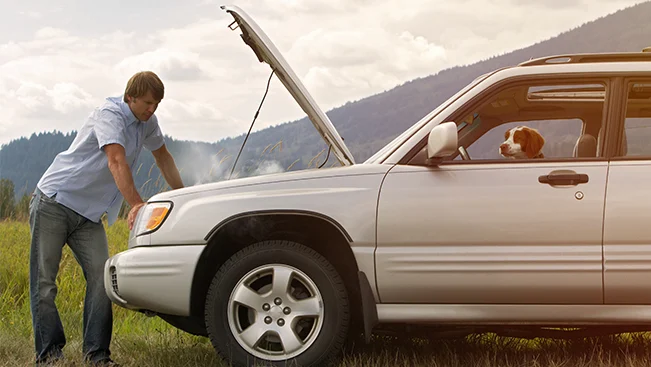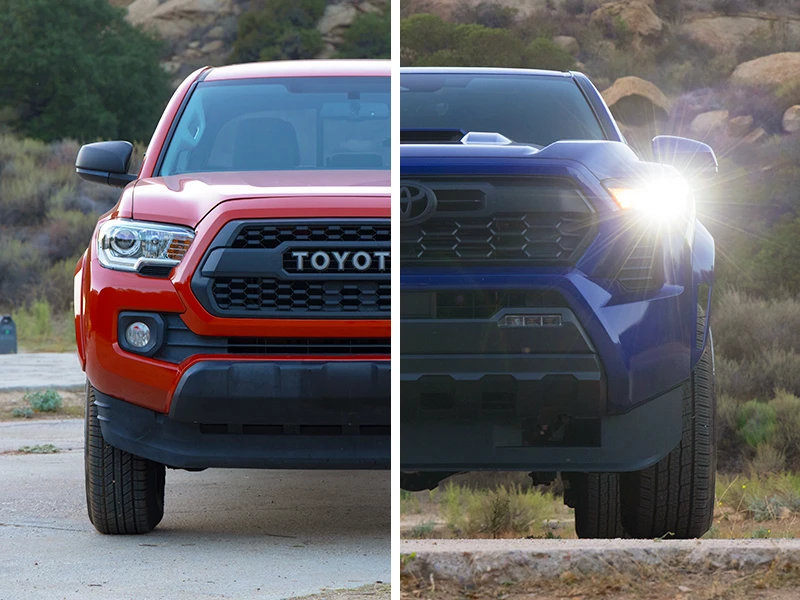Weighing the cost of repairs against buying a more modern car.

With thousands of vehicles in our inventory, we’re here to help make car research easier for you. We’ve partnered with car-review experts from Edmunds to weigh in on what matters most, whether you’re looking to buy or sell a car.
***
Your car broke down, and now you're faced with a high repair bill. It's not the first time this has happened, and you're getting tired of pouring money into an aging machine. A car with a newer model year would be nice, but is that the smartest decision? Would you be better off fixing your current ride, or is it time to sell and buy another one? There's no clear-cut answer to these questions, but we can show the pros and cons of each option to help you make a more informed decision.
The Costs of Wear and Tear
Even if you've taken good care of your car, some high-priced repairs are unavoidable, sometimes due to excessive wear or time itself. Rubber belts and hoses dry out and crack, metal on rotors warp or wear too thin, and electrical parts stop working. Wear-and-tear items such as axle boots, belts, and brake rotors will eventually need to be replaced. The timing belt has long been a big-ticket item on high-mileage cars. On many cars, it needs to be replaced at around 100,000 miles. Dealership service advisers will often recommend replacing the water pump and the other drive belts in the car at the same time. Repairs such as this one begin to surface between 90,000 and 120,000 miles.
Arguments for Fixing Up
Upgrading to a different car might not be right for you, for budgetary or other reasons. Here are a few examples why it might be a good idea to get the repairs done.
It can be less expensive to repair a car than buy another one.
Something as severe as a blown motor or a failed transmission will command a high price tag. That money would certainly make a nice down payment instead, but then again you must consider the monthly payments.
Insurance and registration fees generally run higher on a newer car.
You need the car to last a while longer. Let's say you were planning on getting another car in a year or two, but it broke down earlier than expected. Repairing it now will help you stay on the road and keep you from making a hasty purchase. It will also give you more time to save up and get your finances in order.
You have a sentimental attachment to your car. Maybe it was your first car, a gift from a loved one, or a dream car you finally were able to purchase. For you, buying another car would mean giving up an old friend. This is not the strongest argument for fixing it up, but it's a real one.
Arguments for Upgrading Your Ride
You swore you wouldn't put another penny into your old car after that last repair. But buying another car seems like an intimidating prospect. Here are a few reasons why it might be the way to go.
You don't want to fret about breakdowns. If your current car has had issues in the past, repairing a single problem doesn't guarantee that another breakdown won't happen with another part or system. More recent model years are often still covered by a manufacturer's warranty. This means you might have several years before you'll have to worry about paying for any major repairs, depending on how much of the manufacturer’s warranty is left.
You're tired of the constant trips to the repair shop. Some things don't get fixed the first time around, while others seem to need constant attention. Either way, trips to the mechanic are costing you too much money and time away from work or family.
You're fed up with the car you have. Perhaps it's so beat that it embarrasses you. It rattles like crazy. Or you have to bang on the A/C to get it working. All of these are reasons to move on. Take a look at your budget and make an honest assessment of your financial situation.
You want more modern driver aids and technology. Features such as automatic emergency braking, backup cameras and blind-spot monitoring are increasingly becoming easier to find.
When Is It Time to Buy Another Car?
Here are a few scenarios in which we'd opt for buying another vehicle:
The repairs are becoming more frequent, and the costs are hard to keep up with.
The car leaves you stranded often, putting you in a potentially dangerous situation or making you late to work.
The repair in question will cost more than half the value of the vehicle.
Your mechanic clues you in on an impending major repair on your old car. Hold off and let the next owner handle it. Just be upfront about the issue when it comes time to sell.
Extend the Life of Your Car
If you're not yet facing the tough decision to fix up or trade in your vehicle, there are steps you can take to help prevent or avoid costly repairs.
Get your car maintained at its recommended intervals to avoid problems and breakdowns. Maintaining a much older car means paying close attention to items that commonly break down. We recommend finding a trusted vehicle service provider to help keep your car on the road as long as possible.
If you're experiencing issues with your car and don't know whether things are likely to get worse, look for comments on message boards and forums for the make and model of your car. Other people have probably been down this road before you. You might be able to get a preview from them of some of the problems associated with your vehicle as it ages.
Don't Let the Clunker Decide for You
Everyone seems to have a theory on when to repair a car and when to get another one. But you know your needs and your car's history better than anyone else, so use these tips as a guide, not gospel. Buying another car might seem like the easy way out of a high repair bill, but depending on your circumstances, it might not be the best financial decision.
On the other hand, a car that's teetering on the edge of oblivion can keep you awake at night. It's better to part with that car on your terms rather than waiting for it to break down at exactly the wrong time. If you make the decision while the car has some value, you can sell it or trade it in, And it's hard to put a price tag on the peace of mind that a more stable vehicle can bring.




